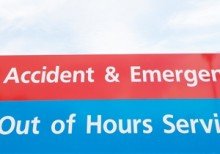Having been challenged to explain, in a couple of paragraphs, Transforming Urgent and Emergency Care Services in England , an NHS England document of 57 pages. Here is my attempt at a couple of paragraphs; I failed miserably.
OK, here we go.We have all got used to having an out of hours health service that hasn’t really delivered over the years. We go dashing down to A&E instead, for all and sundry be it a splinter, not that most of us would turn up for a splinter, or something life threatening.Add in the social care of the elderly with care providers, amongst others,becoming risk averse due to litigation; ‘we did everything that we should and are therefore in the clear, anyway if the worst happens we are insured’ and no wonder this causes problems for hospitals coping. In particular beds being taken up where some patients would have been better treated in the community. Add in difficulties of discharge and paperwork etc and you have stagnation, things grind to a halt.The patients stack up, some not even being able to get into A&E etc etc.
Togive them their due – NHS England said lets have a think and see if there is a better way. Hence the above document.The main thrust was to look at the areas I’ve covered and to look at how a more, fit for purpose,U&EC service would work and then roll it out nationally via a few ‘Vanguard’initiativestesting and learningto iron out as many problems as it could. Theydidn’t study current the system too muchwithlots of A&Es of different sizes and capabilities and not all of them delivering the best outcomes particularly the split between life threatening trauma and things that were urgent, but not life threatening.It needed sorting, starting again as it were. Result, some of the solutions were obvious andrelativelyeasy to implementothers will take time to get into place.
First a question; don’t worry, I’ll answer it for you.
Question: Where would it be best to treat someone who has a life threatening situation?
Answer: As soon as and as close to where the problem started and to make them ready for the journey to hospital.
We already do this with our superb response teams.Their job is to stabilise the patient where they are and this can take quite a while and then transport them to the Trauma Centre of choice.It is the coordinated response that makes the difference and once at the trauma centre speedy treatment from a consultant led medical team will give the best possible outcomes. Hence the move to have the A&E Trauma such huge numbers of Urgent cases.They will still treat the non-life threatening cases, but they will not be the priority.
Then there isthe rest:
Urgent non-life threatening conditions can be dealt more easily in Urgent Care Centres., as they currently are all over Dorset. UCCs, or Minor Injury Units, as some are called,have a restricted set of things they can do, but they provide superb service too. We can reduce the demand still further if we improve the 111 service,which really isn’t working as well as it could. Interestingly the Isle of Wight has a good system and it is within the NHS Wessex area,as is Dorset. Then if if we took more care of ourselves and seek help from other possible sources we would not be placing such undue strain on the A&E and the UCCs.
Lastly there are the cases that are better treated where they are – at home, be it a family or care home. This will involve changes to the out of hour’s services and to local authority’s social care and there is joined up working with the NHS to improve care in the community. Some of us are old enough to remember when there was no split between medical and personal needs. This last one will be crucial. There is some cross over funding and initiative.
Finally it will take time to sort out. There are some big hurdles. No doubt there will be hiccup sand changes on the way, but the people on the ground are doing a great job now and will continue to give their best.Currently Poole is the Major Trauma A&E whilst Royal Bournemouth is an ordinary, if there is such a thing, A&E. Under the proposals from CCG one A&E will be replaced by a Urgent Care Centre and it is yet to be decide if this will be at Bournemouth with Poole staying as is or,under their preferred option,they would take Poole’s major trauma A&E away and replace it with a UCC.
I am still worried about the reduced remit of a UCC for either hospital. It wouldn’t be quite so much of a dramatic change if there were a halfway house between an ‘ordinary’A&E as against the UCC.My only real concern regarding the CCG proposals is that,for whichever hospital gets the UCC, it will be a downward shift. It will be dependent on the changes in reducing demands at the hospital and protocols to ensure anyone who turns up with a more serious condition is not disadvantage by not having an A&E. Hence my questions about the 80% assertion by Dorset CCG, for which they have not yet given a suitable explanation. Is it just a guess or based on hard evidence?
I will add the caveat – I am more than happy to stand corrected an anything I have raised by anyone who has greater understanding and knowledge than I currently have.
©John Daniels







